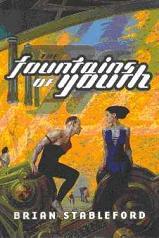
Fountains of Youth
Brian Stableford
393 pages
published in 2004
Fountains of Youth is the most Clarkean science fiction novel I've read in a long time. Several times while reading it I was reminded of Arthur C. Clarke novels like Imperial Earth or Childhood's End. This was not because Stableford has taken the plot or the subject matter of these novels, but because the tone of it, the writing style as well as the background assumptions of it are so similar to how Clarke would've written the same novel.
Take Fountains of Youth's protagonist for a start. Mortimer Grey is one of the first genuine emortals --genetically altered humans who barring accident or foul practise can live forever-- whose lifework it is to write the definitive History of Death. The conceit is that Fountains of Youth is supposed to be Grey's autobiography. He comes across as rational but detached, calm but emotionally stunted, as somebody who doesn't participate as much as observe from the sidelines. That is the archetypical Clarke protagonist; it could've been Duncan Makenzie from Imperial Earth.
The world in which Fountains of Youth is set is also very Clarkean. A near-utopian united Earth, with no wars or other international conflicts some five centuries after the big Crash that in the 21st century almost meant the extinction of humanity. This world seems to be a benign dictatorship, run by a cabal of megacooperations and the UN bureaucracy. Real politics are almost absent in this book, even though some of the plot revolves around various political upheavals going on around Mortimer. The rest of the world Stableford creates for us has some of the same blandness of the politics he shows. There don't seem to be many cultural differences remaining in this world and everybody behaves like a member of some science orientated liberal arts college, similar to how Larry Niven always seemed to populate his novels with refugees from an early sixties Californian cocktail party...
All of this may sound as if Fountains of Youth is a novel you should stay clear from, unoriginal and dull, but that would be far too harsh a judgement. It's not the best science fiction novel I've read this year and it doesn't quite achieve what it set out to do, but it was still an interesting attempt at creating a novel from the point of view of somebody who is genuinely immortal. It doesn't quite work largely because Mortimer Grey himself is such a dull, unobservant person (he reminds me of some computer nerds I know) who isn't really capable to describe what's it's really like to live for centuries. Moreover, he constantly seems to be at the edge of important events, but he never really notices until they intersect with his own obsessions. Which means that the historical events he writes about in his supposed autobiography are described as if observed through a metre of dirty glass....
It doesn't help that I don't really believe in the world Stableford has created. It sounds and feels too much as if, like I said above, everybody in it behaves like the member of some science orientated liberal arts college, but minus the usual collegiate backstabbing and intrigue. Everybody in this book is too sensible for words, even the loons.
Read more about:
Brian Stableford,
Fountains of Youth,
science fiction,
book review